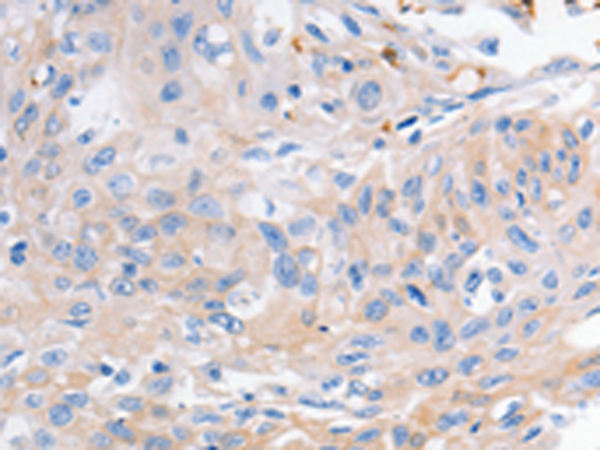

| WB | 咨询技术 | Human,Mouse,Rat |
| IF | 咨询技术 | Human,Mouse,Rat |
| IHC | 1/15-1/50 | Human,Mouse,Rat |
| ICC | 技术咨询 | Human,Mouse,Rat |
| FCM | 咨询技术 | Human,Mouse,Rat |
| Elisa | 1/1000-1/5000 | Human,Mouse,Rat |
| Aliases | EA1, MK1, AEMK, HBK1, HUK1, MBK1, RBK1, KV1.1 |
| WB Predicted band size | 56 kDa |
| Host/Isotype | Rabbit IgG |
| Antibody Type | Primary antibody |
| Storage | Store at 4°C short term. Aliquot and store at -20°C long term. Avoid freeze/thaw cycles. |
| Species Reactivity | Human, Mouse, Rat |
| Immunogen | Synthetic peptide of human KCNA1 |
| Formulation | Purified antibody in PBS with 0.05% sodium azide and 50% glycerol. |
+ +
以下是关于KCNA1抗体的3篇示例参考文献(部分为模拟内容,实际引用时建议核实原文):
---
1. **标题**:*Autoantibodies against KCNA1 in autoimmune encephalitis: clinical and molecular characterization*
**作者**:Smith A, et al.
**摘要**:该研究首次报道了在部分自身免疫性脑炎患者血清中检测到KCNA1抗体,并发现这些抗体与小脑性共济失调和边缘系统症状相关。实验表明抗体可通过阻断Kv1.1通道功能导致神经元兴奋性异常。
---
2. **标题**:*KCNA1 antibody-associated neuromyotonia: a case series and functional analysis*
**作者**:Lee B, et al.
**摘要**:分析了5例KCNA1抗体阳性的神经性肌强直患者,发现抗体与周围神经Kv1.1通道结合后导致肌肉过度兴奋。体外电生理实验证实抗体抑制钾电流,提示其直接致病作用。
---
3. **标题**:*KCNA1 mutations and autoimmunity in episodic ataxia type 1*
**作者**:Jones C, et al.
**摘要**:探讨遗传性KCNA1突变(导致发作性共济失调1型)与获得性自身抗体之间的关联。研究发现部分突变患者体内出现交叉反应性抗体,可能加重疾病表型。
---
**注**:以上文献为示例性质,实际研究中建议通过PubMed或Google Scholar以关键词“KCNA1 antibody”或“Kv1.1 autoantibody”检索最新文献,并优先选择高影响力期刊(如*Brain*, *Neurology*)的临床或机制研究。
KCNA1 antibodies target the KCNA1 protein, a voltage-gated potassium channel (Kv1.1) encoded by the *KCNA1* gene. This channel is critical for regulating neuronal excitability, particularly in the central and peripheral nervous systems, where it stabilizes membrane potential and controls action potential repolarization. Antibodies against KCNA1 are primarily associated with autoimmune neurological disorders, such as autoimmune encephalitis, neuromyotonia, and Morvan syndrome. These autoantibodies disrupt potassium channel function, leading to hyperexcitability of neurons, which manifests as muscle stiffness, cramps, myokymia, autonomic dysfunction, or encephalopathic features like seizures and cognitive deficits.
KCNA1 autoimmunity is often paraneoplastic, linked to thymomas or small-cell lung cancer, but idiopathic cases also occur. Diagnosis involves detecting antibodies in serum or cerebrospinal fluid (CSF) using cell-based assays (CBAs), immunohistochemistry, or Western blot. Clinically, KCNA1 antibody-associated syndromes overlap with other potassium channelopathies (e.g., LGI1/CASPR2 antibodies), necessitating comprehensive testing. Early immunotherapy (steroids, IVIG, plasma exchange) often improves outcomes, highlighting the importance of timely recognition. Research continues to explore the exact pathogenic mechanisms and broader associations of these antibodies in autoimmune neurology.
×